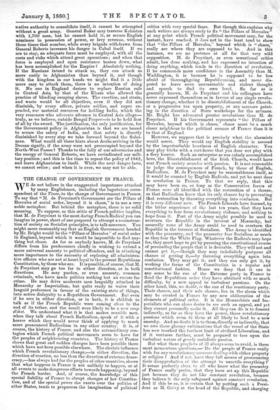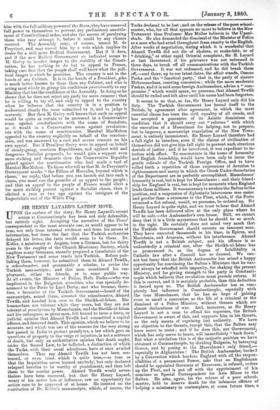THE CHANGE OF GOVERNMENT IN FRANCE. • W E do not
believe in the exaggerated importance attached by many Englishmen, including the lugubrious corre- spondent of the Times, to the change of Government in France. To say that "M. de Freycinet's Government are the Pillars of Hercules of social order, beyond it is chaos," is to use a very noble metaphor. But behind the metaphor, there is no solid meaning. To suppose, as this critic of French politics implies, that M. de Freycinet is the most daring French Radical you can imagine in power, short of one prepared to attempt a reconstruc- tion of society on Socialist principles, is to talk nonsense. You might more reasonably say that an English Government headed by Mr. Bright would be the "Pillars of Hercules" of social order in England, beyond which it would be impossible to find any- thing but chaos. As far as anybody knows, M. de Freycinet differs from his predecessors chiefly in wishing to extend a more universal amnesty to political offenders, and in attaching more importance to the necessity of replacing all administra- tive officers who are not at heart loyal to the present Republican Constitution, by those who are. It is possible, of course, that M. de Freycinet may go too far in either direction, or in both directions. He may pardon, or even amnesty, common criminals, who have made politics nothing but an excuse for crime. He may drive moderate men languidly attached to Monarchy or Imperialism, but quite ready to waive their languid preference in favour of the existing state of things, into active disloyalty to a Republican Government. But even if he errs in either direction, or in both, it is childish to talk as if the French Republic were coming close to the end, of its tether, and the result were likely to be a new coup d'itat. We understand what it is that makes sensible men, when they talk about French Radicalism, speak of it with a horror which they would never think of applying to much more pronounced Radicalism in any other country. It is, of course, the history of France, and also the extraordinary con- tagion which French political movements seem to have for the peoples of neighbouring countries. The history of France shows that great and sudden changes have been possible there which have not been possible elsewhere. The electric influence which French revolutionary change,—in either direction, the direction of reaction, no less than the direction of extreme demo- cracy,—has always had for the peoples of other countries, shows that what happens in France is not unlikely to happen, or at all events to make dangerous efforts towards happening, beyond the French border. And, of course, the knowledge of this special liability of France to abrupt changes of her Constitu- tion, and of the special power she exerts over the politics of other States, tends to prepossess the imagination of political critics with very special fears. But though this explains why such writers are always ready to fix "the Pillars of Hercules" at any point which French political movement may, for the instant, have reached, it does not in the least tend to show that "the Pillars of Hercules," beyond which is "chaos," really are where they are supposed to be. And in this instance, we see no pretence at all for that very wild supposition. M. de Freycinet, as even sensational critics admit, has done nothing, and has expressed no intention of doing anything, which tends in the direction of revolution. If he commands more confidence in the Assembly than M.
Waddington, it is because he is supposed to be less afraid of thoroughgoing Republicanism, and more die- poged to leave even unreasonable and violent thought and speech to find its own level. So far as is generally known, M. de Freycinet and his colleagues have never expressed themselves as in favour of any single revolu- tionary change, whether it be disestablishment of the Church, or a progressive tax upon property, or any measure point- ing in the direction of State workshops for the artisans.
Mr. Bright has advocated greater revolutions than M. de Freycinet. If his Government represents "the Pillars of Hercules, beyond which is chaos," chaos must be a much closer neighbour to the political cosmos of France than it is to that of England.
However, we suppose that is precisely what the alarmists would assert. They would say English stability is assured by the imperturbable heaviness of English character. You may play tricks with a cart-horse that you dare not play with a fiery hunter. Such an enterprise as was calmly accomplished here, the Disestablishment of the Irish Church, would have rent French society asunder with passion. It is not reasonable to judge the consequences of French, by those of English, Radicalism. M. de Freycinet may be reasonableness itself, as it would be counted by English Radicals, and yet be next door to revolution in France. To that we reply, that this may have been so, so long as the Conservative forces of France were all identified with the restoration of a throne, so that Radicalism knew that its only chance lay in preventing that restoration by throwing everything into confusion. But it is very different now. The French Liberals have learned, by the bitter experience of the last ten years, that they have everything to fear from revolutionary violence, and nothing to hope from it. Part of the Army might possibly be used to overturn the Republic in the interest of Monarchy, but assuredly none of the Army could be used to overturn the Republic in the interest of Socialism. The Army is identified with the peasantry, and the peasantry fear Socialism as much as they fear the White Flag. Whatever the Radicals may hope for, they must hope to get by pursuing the constitutional course of persuading the people that it is desirable. They will not and cannot get it,—though they may indefinitely postpone all chance of getting it,—by throwing everything again into confusion. They may get it, and they can only get it, by working the forms of the Constitution in a regular and constitutional fashion. Hence we deny that it can in any sense be the cue of the Extreme party in France to flood the Republican order they have obtained with so much difficulty, by a new appeal to turbulent passions. On the other hand, this, no doubt, is the cue of the reactionary party. Their chance, and their sole chance, lies in the alarm which may be created in France by any new obliteration of the elements of political order. It is the Monarchists and Im- perialists who can alone desire to see such an appeal, and yet they cannot personally make it. All they can do is to foment indirectly, so far as they have the power, those revolutionary passions which seem to them at all likely to lead to a new anarchy. And no doubt it is to them, directly or indirectly, that we owe these gloomy vaticinations that the vessel of the State has now touched the furthest limit of civilised Liberalism, and if it ventures further, must be prepared to toss upon the turbulent waters of greedy socialistic passion.
But what these prophets of ill always seem to avoid, is these most Momentous questions,—' Do the people of France really wish for any revolutionary measure dealing with either property or religion ? And if not, have they full means of pronouncing their disapprobation of the attempt to unsettle everything?' It seems perfectly clear, to all who know what the peasantry of France really prefer, that they have set up this Republic just because they do not like constant revolution, because they believe it the only safeguard against constant revolution. And if this be so, it is certain that by putting such a Presi- dent as M. Gr6vy at the head of the Republic, and charging him with the full military powers of the State, they have reserved full power to themselves to prevent any preliminary unsettle- ment of Constitutional order, and also the means of paralysing those who may attempt it, before it could by any chance succeed. The Assembly may, of course, unseat M. de Freycinet, and may unseat him by a vote which implies its desire for a still more Radical Government. But if it does, and if the new Radical Government so indicated seems to M. Grevy to involve danger to the stability of the Consti- tution, he has nothing to do but to appeal to France, taking care first that the people shall well know what the poli- tical danger is which he perceives. The country is not in the hands of any Cabinet. It is in the hands of a President, jvho is much better known to them than any Cabinet, and who is acting most wisely in giving his confidence provisionally to any Ministry that has the confidence of the Assembly. In doing so he shows that he does not reject any party for mere rumour ; that he is willing to try all, and only to appeal to the country when he believes that the country is in a position to understand clearly the issue submitted to it, and to judge it maturely. But then M. Grevy well knows that such an appeal would be quite as certain to be answered in a Conservative sense against revolutionists with the name of Socialists, as it would in a Conservative sense against revolution- ists with the name of reactionaries. Marshal MacMahon appealed to the country explicitly on behalf of the reaction- aries, and was answered by a curt and severe censure on his own appeal. But if President Grevy were to appeal on behalf of steady-going, cautious Republicans, and against wild and dangerous Socialist proposals, he would gain a support even more striking and dramatic than the Conservative Republic gained against the reactionaries who had made a tool of Marshal MacMahon. To those who tell us that M. de Freycinet's Government marks "the Pillars of Hercules, beyond which is chaos," we reply, that before you can launch out into such a chaos, you must run the gauntlet of an appeal to the people ; and that an appeal to the people of France would elicit a far more striking protest against a Socialist chaos, than it elicited a year or two ago against the intrigues of the Imperialists and of the White Flag.











































 Previous page
Previous page